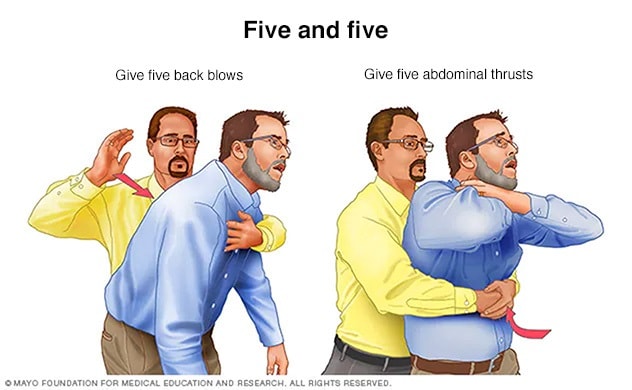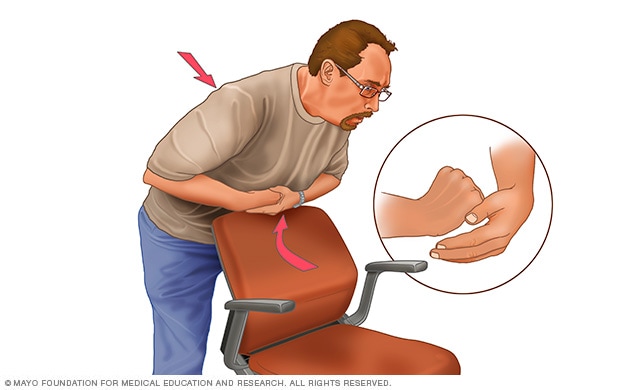Foreign object inhaled: First aid
First aid for a choking person
First aid for a choking person

First aid for a choking person
If a person is choking and cannot talk, cry or laugh forcefully, the American Red Cross recommends this approach to delivering first aid.
If you or your child inhales a foreign object, see your health care provider. If an inhaled foreign object causes choking, you’ll need to perform first aid.
If a choking person can cough forcefully, let the person keep coughing.
Coughing might naturally remove the stuck object.
If a person can’t cough, talk, cry or laugh forcefully, give first aid to the person.
The American Red Cross recommends the following steps:
- Give five back blows. Stand to the side and just behind a choking adult. For a child, kneel down behind. Place your arm across the person’s chest to support the person’s body. Bend the person over at the waist to face the ground. Strike five separate times between the person’s shoulder blades with the heel of your hand.
- Give five abdominal thrusts. If back blows don’t remove the stuck object, give five abdominal thrusts, also known as the Heimlich maneuver.
- Alternate between five blows and five thrusts until the blockage is dislodged.
If you’re the only rescuer, give back blows and abdominal thrusts first. Then, call 911 or your local emergency number for help. If another person is there, have that person call for help while you give first aid
If the person who has inhaled an object becomes unconscious:
- Lower the person onto the floor, with the back on the floor and arms to the sides.
- Clear the airway. If you can see the object, reach a finger into the mouth to sweep out the object. Never finger sweep if you can’t see the object. You risk pushing the blockage deeper into the airway. This is very risky with young children.
- Begin CPR if the person still doesn’t respond. If the airway is still blocked, use chest compressions such as those that are used in CPR to remove the stuck object. Only use two rescue breaths per cycle. Recheck the mouth regularly for the object.
Some sources only teach the abdominal thrust. It’s OK not to use back blows if you haven’t learned the back-blow technique. Both approaches are acceptable for adults and children older than age 1.
To give abdominal thrusts to someone else:
- Stand behind the person. For a child, kneel down behind. Place one foot slightly in front of the other for balance. Wrap your arms around the waist. Tip the person forward slightly.
- Make a fist with one hand. Put it just above the person’s navel.
- Grasp the fist with the other hand. Press into the stomach, also called the abdomen, with a quick, upward thrust — as if trying to lift the person up. For a child, use gentle yet firm pressure to avoid damaging the internal organs.
- Give five abdominal thrusts. Check if the blockage has been removed. Repeat as needed.
If the person is pregnant or if you can’t get your arms around the stomach, give chest thrusts:
- Put your hands at the base of the breastbone, just above the joining of the lowest ribs.
- Press hard into the chest with a quick thrust. This is the same action as the Heimlich maneuver.
- Repeat until the blockage is removed from the airway.
If you’re alone and choking:
How to perform abdominal thrusts, also called the Heimlich maneuver, on yourself
How to perform abdominal thrusts, also called the Heimlich maneuver, on yourself

How to perform abdominal thrusts, also called the Heimlich maneuver, on yourself
To perform abdominal thrusts, also called the Heimlich maneuver, on yourself, place a fist slightly above your navel. Grasp your fist with the other hand and bend over a hard surface. Shove your fist inward and upward.
Call 911 or your local emergency number right away. Then, give yourself abdominal thrusts, also called the Heimlich maneuver, to remove the item from the airway.
- Place a fist slightly above your navel.
- Grasp your fist with the other hand.
- Bend over a hard surface such as a countertop or chair.
- Shove your fist inward and upward.
Oct. 19, 2022
.
For all the latest Health News Click Here
For the latest news and updates, follow us on Google News.
